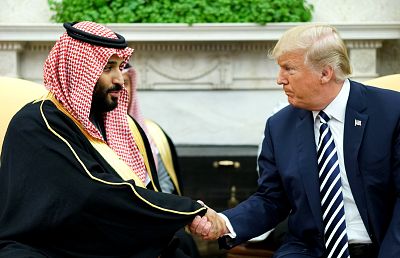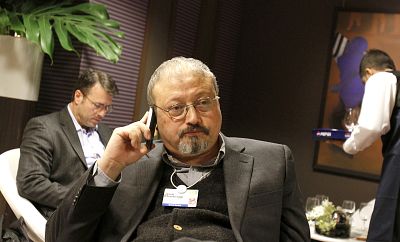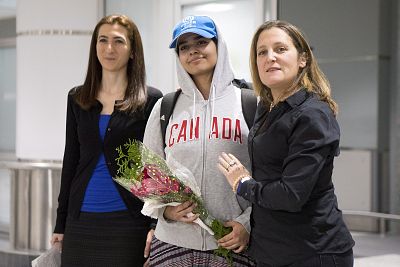As Secretary of State Mike Pompeo visits Riyadh, Saudi Arabia faces no penalties from Washington over its dismal human rights record.
WASHINGTON — Saudi Arabia shows no sign of easing up on its crackdown against dissent and the Trump administration remains reluctant to punish the kingdom over its alleged abuses, including the killing of Saudi writer Jamal Khashoggi, former U.S. officials, foreign diplomats and human rights groups told NBC News.
In the run-up to Secretary of State Mike Pompeo's visit to Riyadh on Sunday, the Trump administration expressed praise for the kingdom's role in the region and issued no warnings of any further sanctions over the Khashoggi case — or other reported rights abuses.
Pompeo met with Saudi Crown Prince Mohammed bin Salman at the palace for about 45 minutes on Monday, though it was unclear how much was one-on-one and how much included officials.
In a speech Thursday in Cairo, Pompeo spoke of restoring U.S. leadership in the region but did not mention human rights or refer to the killing of Khashoggi. The CIA has assessed thatbin Salman ordered his murder.
Experts and former officials say Pompeo's failure to address human rights abuses broke with a decades-long American diplomatic tradition and represented a missed opportunity to deliver a tough message that Washington would not turn a blind eye to the trampling of civil liberties in Saudi Arabia or elsewhere in the Middle East.
"They've made it clear they're going to stand behind MBS," said Andrea Prasow of Human Rights Watch, referring to the crown prince.
While Pompeo and other U.S. officials might privately convey to Riyadh their concerns over Khashoggi's murder, Prasow said it's hard to see how that would have an effect "because Mohammed bin Salman has a very strong basis to assume that the U.S. will not alter its behavior regardless of what he does."
Before arriving in Riyadh, the secretary of state said Sunday the U.S. would ensure there is "full and complete" accountability for Khashoggi's murder.
"We will continue to talk about that and make sure we have all the facts so that they are held accountable certainly by the Saudis but by the U.S. as well where appropriate," Pompeo said in Doha.
Bin Salman has denied any role in the death and Saudi authorities have put 11 suspects on trial for the killing.
But the U.S. government believes the crown prince remains in communication with Saud al-Qahtani, an adviser to bin Salman who the CIA suspects organized the assassination of Khashoggi. The Washington Post first reported the two were in contact. Qahtani was fired from his post in the wake of the Khashoggi killing.
Long before Khashoggi was killed by government agents inside the Saudi consulate in Istanbul on Oct. 2, 2018, the kingdom launched a sweeping crackdown on all forms of political criticism, targeting activists, women's rights advocates, academics and prominent clerics, according to human rights groups and former U.S. officials.
Even in a country with a dismal human rights record, the government's clampdown in recent years has marked a dramatic plunge into repression, with dozens — possibly hundreds — imprisoned and tortured for actions that might have earned them a brief detention in the past, according to human rights groups and former U.S. officials.
"Saudi Arabia has always been a gross violator of human rights, but the level of repression under Mohammed bin Salman and the reach of the kingdom's security services and their willingness to follow citizens around the world seems to have increased significantly," said Philippe Nassif of Amnesty International.
The campaign has coincided with the rise of bin Salman in the kingdom's leadership, culminating with his elderly father, King Salman, naming him crown prince in June 2017. The crown prince, or MBS, has portrayed himself as a visionary reformer but he has shown an intolerance for criticism or independent-minded public figures. His adviser, Qahtani, who oversaw a cyber security office, also played a pivotal role in the repression, rights groups and U.S. officials say.
The long list of political prisoners currently behind bars includes a group of women's rights activists who pushed for an end to the ban on women driving. The activists were rounded up shortly before the ban was lifted last June.
Four of them have been subjected to torture, sexual harassment and sexual assault, according to Human Rights Watch and other rights advocates, which cited informed sources that asked to remain anonymous for fear of reprisal.
Saudi authorities allegedly administered electric shocks, whipped the women on their thighs, and forced them to hug and kiss, Human Rights Watch said.
Following the interrogations, the women allegedly showed physical signs of torture, including difficulty walking, uncontrolled shaking of the hands, and red marks and scratches on their faces and necks.
Saudi Arabia has denied the allegations. But Saudi officials also initially denied Khashoggi had been killed in the consulate in Istanbul.
An independent Saudi group that monitors human rights in Saudi Arabia, ALQST, reported that two of the detained female activists saw the crown prince's longtime adviser, Qahtani, in the building where the torture was being carried out.
The imprisoned female activists include Samar Badawi, who campaigned for women's voting rights and an end to male guardianship laws that require women to obtain permission from a male family member before traveling abroad, obtaining a passport or getting married. In 2012, the State Department gave her the U.S. International Women of Courage Award, which was presented by then-first lady Michelle Obama and Hillary Clinton.
Even the mother of the Saudi crown prince has had her movements restricted at times, current and former U.S. officials told NBC News earlier this year. The officials said intelligence showed MBS has often blocked her from seeing the king and even put his mother under house arrest for a period, as he feared she could undermine his grab for power.
Saudi Arabia's official discrimination against women surpasses that of other conservative Islamic countries in the Gulf, rights advocates say, and recent cases of young Saudi women seeking asylum abroad have highlighted their plight.
Eighteen-year-old Rahaf Mohammed Alqunun barricaded herself in her hotel room in Bangkok this month to avoid being deported. She appealed for asylum on Twitter, saying she was fleeing abuse by her family.
The U.N. High Commissioner of Refugees took up her case and eventually Canada granted her asylum, with Foreign Minister Chrystia Freeland greeting her after she landed in Toronto on Saturday, introducing her as "a very brave new Canadian."
Although Saudi Arabia has never allowed anything approaching freedom of expression, under the crown prince's influence, the space for permissible public debate has come under unprecedented pressure. Saudi authorities are now requesting the death penalty for relatively routine cases of political dissent and public figures have faced punishment in some cases not for critical remarks, but merely for failing to rally behind the regime, experts said.
Salman al-Awda, a cleric with a large following, was allegedly punished because he failed to follow an order from Saudi authorities to tweet a specific text to support the Saudi-led blockade of Qatar, his relative told rights organizations. Instead, he called for reconciliation with Qatar.
"Dissent today is not about voicing your opposition to policies or opposition to the regime. If you're a public figure it becomes about you not actively supporting the regime," said Yasmine Farouk, a visiting scholar at the Carnegie Endowment for International Peace.
A Saudi group that tries to track political prisoners, Prisoners of Conscience, estimated last September that there are more than 2,600 Saudi dissidents in detention.
Saudi Arabia's embassy in Washington did not respond to requests for comment.
Apart from imposing sanctions on 17 individuals over the Khashoggi murder, President Donald Trump has signaled no plans to review the U.S. alliance with Riyadh, suspend any arms sales or pursue any more punitive measures. Instead, the president has touted the importance of the U.S. relationship with Saudi Arabia, citing its purchases of U.S. military hardware, its oil riches and its strong opposition to Iran.
Former U.S. officials and regional experts say failing to put Saudi Arabia on notice could end up backfiring badly, and produce yet more violent extremism. By choking off any avenue for peaceful dissent, the Saudi regime could incubate future terrorists, who will seek to target both the Saudi royal family and its patrons in Washington, Farouk said.
But the Khashoggi killing, along with Saudi Arabia's disastrous military campaign in Yemen, has triggered outrage among both Republican and Democrats in Congress that could have long-term consequences for the kingdom. Lawmakers from both parties have vowed to push for legislation that would cut off arms sales to Saudi Arabia, impose mandatory sanctions for those responsible for Khashoggi's death and require a U.S. government report on perpetrators of war crimes in Yemen.
Sen. Bob Menendez, the ranking Democrat on the Senate Foreign Relations Committee, said that Congress is committed to holding Saudi Arabia to account and that lawmakers would be watching closely for how Pompeo handles his visit to Riyadh.
"I sincerely hope he refuses to play fast and loose with language giving the Saudis a free pass on these critical issues," Menendez told NBC News. "He should not use his visit as another empty photo op."














